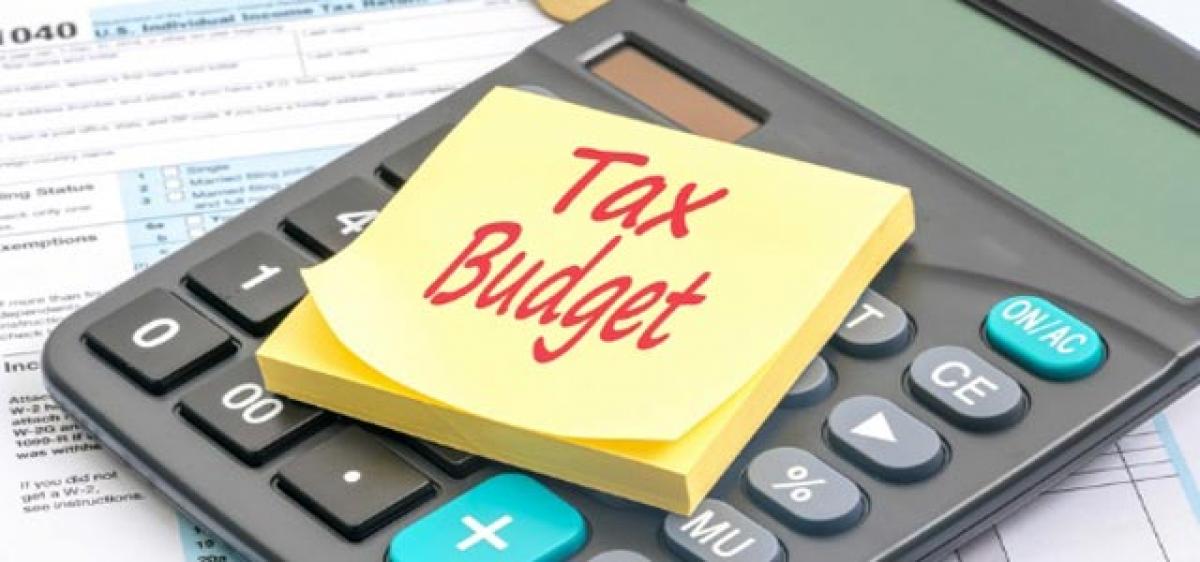Live
- US accounts for 18 per cent of Indian exports in FY24
- Will end Naxalism in Chhattisgarh by March 2026: Amit Shah
- Will gift one project daily to people during Jan Kalyan Parv
- Mahakumbh & the Politics of Sanatan Nationalism
- A Soulful Celebration of Global Music
- Brahmin Community delegation felicitates CM Saini
- Allu Arjun Visits Chiranjeevi’s House for Lunch Meet
- Toyota organising TG Grameena Mahotsav
- Special rituals conducted at Maramma Temple
- Siddaramaiah has special love for Muslims: BJP
Just In

The salaried middle class gained some recognition by Finance Minister Arun Jaitley regarding the compliance related to filing of returns and expectations arose that finance minister will take some steps to reward the honest tax payers and may rationalise the personal income tax structure.
SETBACK TO SALARIED CLASS
The salaried middle class gained some recognition by Finance Minister Arun Jaitley regarding the compliance related to filing of returns and expectations arose that finance minister will take some steps to reward the honest tax payers and may rationalise the personal income tax structure. However, as he moved ahead with his Budget speech, no major change was proposed except that to reduce the rate of tax from 10 percent to 5 percent in the slab of Rs. 2.5 lakhs to Rs 5 lakhs with some changes in rebate under Section 87A thereby resulting in the tax free income of upto Rs 3 lakhs. Besides, 10 percent surcharge has been imposed on the individuals having income between Rs 50 lakh and Rs 1 crore.
The hopes of the salaried middle class was quite high prior to the Budget and there were hopes of tax benefits such as increase in tax free allowances, reintroduction of standard deduction, increase in limits of deductions under Section 80C and the increase in allowability of interest on self occupied house property. However, no major change has been provided leaving the salaried class empty handed at the end of the Budget despite the finance minister himself recognising the fact that the major tax compliance is being done by salaried tax payers.
In my view, rationalisation in the higher tax slabs could have been a major boost to the salaried middle class as well as other tax payers and would have further increased the tax compliance. Though some relief has been provided to the people having investment in immovable property by reducing the holding period from three years to two years for the computation of long-term capital gains having lower tax rate of 20 percent and the shift of year for indexation from 1981 to 2001. This will impact the real estate sector in positive manner and people will be keen to invest in immovable property or liquidate their holdings.
The MSME sector gained some attention from the finance minister and has been lucky for getting the lower 25 percent corporate tax rate. This is likely to favour entrepreneurs and will also boost foreign investment in the MSME sector. However, no major rationalisation has been done in terms of the income tax laws as promised by the finance minister in his first Budget such as reduction in MAT and dividend distribution tax rates and other amendments in complex issues which have been the centre point of litigation between the Income Tax Department and the tax payers.
The government has laid emphasis on the digital payments and payments through the banking channels and proposals such as reducing the threshold for permitted cash transactions to Rs 3 lakhs, provision for disallowance of business and capital expenditure above Rs 10,000 and reduction of rate of presumptive taxation to 6 percent from 8 percent to smaller business are steps towards the same.
The finance minister also proposed an Aadhaar based payment structure and several other initiatives of the government to promote e-payments but the same is difficult to achieve without any parallel infrastructure and regulations to safeguard the people by monitoring the risks and frauds involving digital transactions in India and a lot needs to be done in this connection.
The good thing is that no changes have been proposed during the Budget speech in the indirect taxes such as excise and service tax, which have a direct impact on the prices of various commodities, due to the introduction of GST in the coming year. Overall the focus of Budget has been towards expenditure side leaving the revenue side without much changes.
The Budget, in my view seems to be on track, but a lot needs to be delivered by the finance minister. The rationalisation of income tax laws is the need of the hour and will only complement the expenditure side by increasing the tax compliance and raising the tax collection in the long run.
(The writer is a Chartered Accountant; This article was first published at http://www.firstpost.com. Reprinted with their permission)
By Abhishek Aneja

© 2024 Hyderabad Media House Limited/The Hans India. All rights reserved. Powered by hocalwire.com







